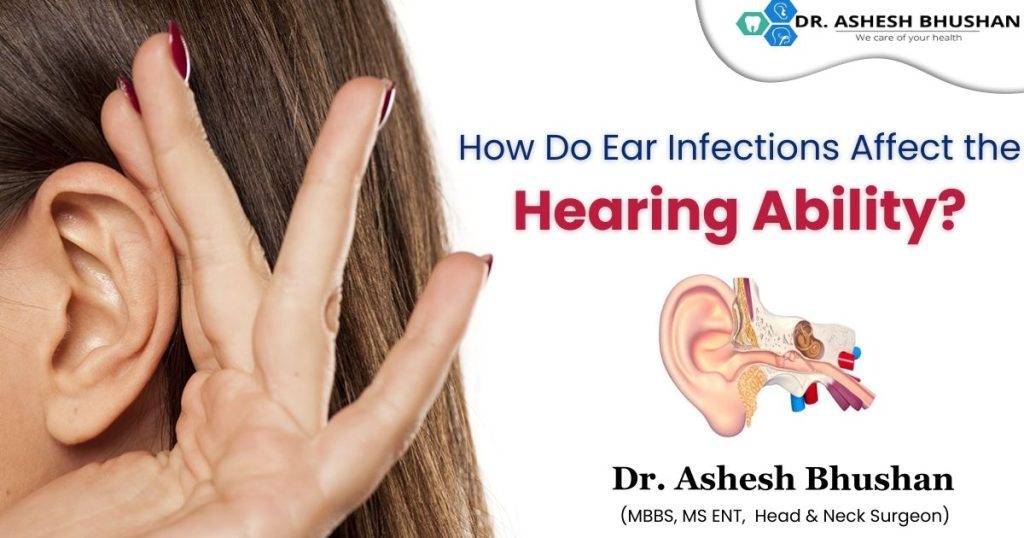
Ear infections may be extremely painful and uncomfortable, and they are very frequent, especially in youngsters. The ability to hear may be compromised by ear infections, which is possibly the most concerning side effect. Let’s know about ear infections with the help of an ENT Doctor and Surgeon in Greater Noida, Dr. Asheesh Bhushan.
An ear infection: what is it?
It’s crucial to remember that several illnesses can be classified as “ear infections,” the most prevalent of which are as follows:
Otitis externa: Affects the ear’s outer segments.
The middle ear is affected by otitis media.
The symptoms of the two illnesses mentioned above are similar:
- An elevated body temperature
- Discomfort in and around the neck or ears
- Redness and swelling
- Discharge from the ear, which is frequently white or yellow.
Nonetheless, several signs and symptoms might aid in distinguishing between the two:
External otitis media: The outer ear feels quite painful to the touch and looks red and inflamed.
Otitis media: Balancing problems as well as a common sense of “fullness” in the ears are possible side effects.
How do you treat an ear infection?
If you or your kid exhibits signs of an ear infection, you must get medical attention. Consultation with an ENT expert is strongly encouraged, since problems may arise as with any infection.
Most doctors would first treat the problem by waiting to see whether the infection goes away on its own, particularly if otitis externa is the diagnosis. Since the body frequently takes time to fight off the illness, the main focus of therapy is typically on reducing discomfort. Until the infection is treated, the individual with the ear infection can be kept comfortable with the use of painkillers and soothing ear sprays.
Some ear infections, meanwhile, may not go away and call for more intensive care. At this time, antibiotics, ear drops, and sprays can be used; oral antibiotic capsules can also be administered. As usual, if you are given antibiotics, you must take them until the end.
How may an ear infection impair one’s ability to hear?
The body’s reaction to an infection, whether it be otitis externa or otitis media, usually results in hearing loss while the illness is active. Sounds become muffled as the ear canal swells, and in certain situations, the afflicted ear’s capacity to hear completely disappears. Most of the time, oedema-induced hearing loss is just momentary; after the infection is treated, the swelling subsides and the hearing returns to normal.
On the other hand, longer-term problems with hearing loss may result from otitis media infections. Hearing loss may occur from fluid accumulation inside the ear caused by an infection in the middle ear that cannot be removed.
How is the accumulation of fluid treated?
Though it may take up to three months, there are instances where middle ear fluid accumulation resolves on its own without the need for additional treatment. Nevertheless, if you or your kid suffers from persistent hearing loss following an illness, it’s crucial to get further medical counsel.
A surgical solution, however, may be taken into consideration if the fluid buildup does not go away or if the patient continues to have infections that make the issue worse. This procedure, sometimes referred to as ear tube surgery, is really simple:
The procedure is carried out as an outpatient one.
The impacted eardrum will have a little hole made by the surgeon. Next, a vacuum is used to empty the fluid.
After that, a little metal or plastic tube is put in to let the middle ear get air, which helps stop ear infections from happening again later on.
Ear tube surgery is most frequently done on children, but it is also an option for adults who have had chronic ear infections. The outcomes are good for those who do get ear tube surgery; fewer ear infections occur, and those who do usually go away very fast.
A person’s ability to hear can be affected by an ear infection, mostly because of swelling but also because of fluid accumulation in the middle ear. Even while these problems usually go away once the illness is gone, fluid accumulation can occasionally persist and may even need surgery to fix.It is strongly advised that you consult an ENT physician if you think you or your kid may have an ear infection.
Is hearing loss in adults a result of an ear infection?
In short, hearing loss in adults can indeed result from ear infections. This is most generally referred to as conductive hearing loss, and it usually results from an accumulation of fluid in the inner ear caused by hearing loss. As a result, the eardrum and the little bones that are linked to it are immobile, which reduces their ability to transmit sound.
Due to their more sensitive ears and immature immune systems, children are more likely than adults to get ear infections, though adults can also get them.
If you are struggling with ENT problems and need help, contact the ENT Specialist in Greater Noida, Dr. Ashesh Bhushan, today.
